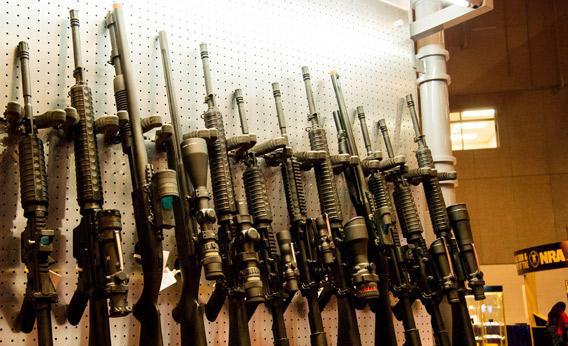It happened again, for the second time in just over two weeks—the horror of a gun-wielding maniac wreaking havoc and death. The attack in Oak Creek, Wis., was motivated by a right-wing racist agenda, one that blames “others” for the problems of the sick individual who pulled the trigger. Yes, people pull the trigger—but guns are the instrument of death.
Gun control is necessary, and delay means more death and horror.
So, what have we heard from the presidential contenders? Pablum. Mitt Romney hides behind a misunderstanding of the Second Amendment, and the White House blames Congress. Here’s what White House press secretary Jay Carney said on Monday: “[President Obama] does support renewing the assault weapons ban. I think what I’ve noted in the past, and what I noted here, is that there has been reluctance by Congress to pass that renewal.”
Here is a different idea: If the White House really wants to act—and not just give us more rhetoric, something it is very good at—it has the tools to do so. And so, for that matter, does Mike Bloomberg, one of the few clarion voices speaking out for gun control.
They could use government’s power in the marketplace—as the largest purchaser of guns—to force the companies we buy from to act responsibly. I first proposed this idea when I was attorney general of New York in 2000, but it proved impossible to forge a coalition of executives willing to act. Maybe things have finally changed.
The government uses its power in the marketplace to influence private companies all the time. Here are just two examples. The infamous TARP program made bailout funds conditional on limits to executive compensation, and properly so. And contractors who want to work for government entities, at the municipal level in particular, in many cases have to pay a “living wage” and ensure diversity in their work force.
Here is how it could work with guns: The Defense Department and the city of New York are among the largest purchasers of guns. If the president and the mayor truly believe that semi-automatic weapons should not be available to private purchasers, and that magazines with more than 10 bullets should not be sold over the counter, they should simply say that, from now on, the federal government and the city of New York, as a matter of public safety, will not buy any weapons or ammunition from companies that do not agree to pull semi-automatics from their stock and refuse to produce magazines with more than 10 rounds other than for sale to the government. President Obama and Mayor Bloomberg should announce that semiautomatic handguns with high-capacity magazines—the kind used in Oak Creek; Aurora, Colo.; Tucson, Ariz.; and Virginia Tech—can no longer be sold to private citizens by any company that wants to do business with the federal government and the city of New York.
The major gun manufacturers will agree to the limits imposed by their major customers.
Use the power of the government as a purchaser, as a consumer, to get the companies marketing these products to change their behavior. And do it now. Stop blaming the legislature and act, immediately.
